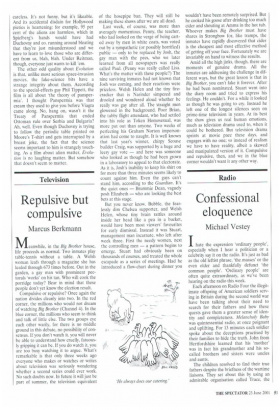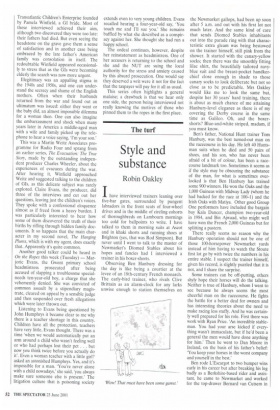Radio
Confessional eloquence
Michael Vestey
Ihate the expression 'ordinary people', especially when I hear a politician or a celebrity say it on the radio. It's just as bad as the old leftist phrase. `the.masses' or the even older and thankfully defunct 'the common people'. 'Ordinary people' are often quite extraordinary, as we've been hearing on the radio this week.
Each afternoon on Radio Four the illegitimate offspring of American soldiers serving in Britain during the second world war have been talking about their need to search for their fathers and how these quests gave them a greater sense of identity and completeness. Melancholy Baby was quintessential radio, at once poignant and uplifting. For 13 minutes each soldier spoke about the deceptions practised by their families to hide the truth. John from Hertfordshire learned that his 'mother' was in fact his grandmother and his socalled brothers and sisters were uncles and aunts.
The children resolved to find their true fathers despite the briefness of the wartime liaisons. They set about this by using an admirable organisation called Trace, the Transatlantic Children's Enterprise founded by Pamela Winfield, a GI bride. Most of those interviewed achieved their aim, although two discovered they were too late: their fathers had died. But even seeing the headstone on the grave gave them a sense of satisfaction and in another case being embraced by the late father's American family was consolation in itself. The redoubtable Winfield appeared occasionally to stress that as the GIs were becoming elderly the search was now more urgent.
Illegitimacy was an appalling stigma in the 1940s and 1950s, and one can understand the secrecy and shame of the English mothers. Often when their husbands returned from the war and found out an ultimatum was issued: either they went or the baby did, an almost impossible dilemma for a woman then. One can also imagine the embarrassment and shock when many years later in America a middle-aged man with a wife and family picked up the telephone to hear a voice saying, 'I'm your son.'
This was a Martin Weitz Associates programme for Radio Four and sprang from an earlier series, The Evacuation: The True Story, made by the outstanding independent producer Charles Wheeler, about the experiences of evacuees during the war. After hearing it, Winfield approached Weitz and suggested talking to the children of GIs, as this delicate subject was rarely explored. Claire Evans, the producer, did three of the interviews and cut out her questions, leaving just the children's voices. They spoke with a confessional eloquence almost as if freed from a heavy burden. I was particularly interested to hear how some of them discovered the truth of their births by rifling through hidden family documents. It so happens that the main character in my second novel, The Hanging Plums, which is with my agent, does exactly that. Apparently it's quite common.
Another good talker could be heard in On the Ropes this week (Tuesday) — Marjorie Evans, the Gwent primary school headmistress prosecuted after being accused of slapping a troublesome specialneeds ten-year-old boy, a charge that she vehemently denied. She was convicted of common assault by a stipendiary magistrate, cleared on appeal by a sensible judge and then suspended over fresh allegations which were later thrown out.
Listening to Evans being questioned by John Humphrys it became clear to me why there is a teacher shortage in this country. Children have all the protection, teachers have very little, Evans thought. There was a time 'when we would automatically put an arm around a child who wasn't feeling well or who had perhaps lost their pet . . . but now you think twice before you actually do it'. Even a woman teacher with a little girl? asked an astonished Humphrys. Yes, and it's impossible for a man. 'You're never alone with a child nowadays,' she said, 'you always make sure someone else is present.' The litigation culture that is poisoning society extends even to very young children. Evans recalled hearing a four-year-old say, 'You touch me and I'll sue you.' She remains baffled by what she described as a conspiracy against her. She thought she had run a happy school.
The ordeal continues, however, despite her reinstatement as headmistress. One of her accusers is returning to the school and she and the NUT are suing the local authority for the stress and anxiety caused by this absurd prosecution. One would say they deserved a writ were it not for the fact that the taxpayer will pay for it all as usual.
This series often highlights a general malaise; a drawback is that we hear only one side, the person being interviewed not really knowing the motives of those who pinned them to the ropes in the first place.



































































 Previous page
Previous page